For just a moment, let go of the idea that gambling is one day going to make you rich.
This blog isn’t about that. It’s quite possible that the math and statistics tools explored here will make you a better gambler, but that’s not really the point.
The point is to appreciate gambling, to relish the ins and outs of this mysterious and beautiful concept of randomness. And doing that starts with understanding why we gamble in the first place—even when we don’t have the best of it.
To Economists, Gambling Doesn’t Make Sense
Smart people know they won’t win most casino games they play. Yet even informed bettors can’t resist trying their hand at negative expectation games like craps, roulette, and blackjack (without counting cards).
So why would a rational, calculating person willingly accept a negative-expectation proposition?
Entertainment doesn’t work as an explanation—any fun one has while gambling is entirely dependent on the money involved and based on the idea of increasing one’s wealth. Take the money away, and the fun is gone. (Ever tried playing blackjack just for giggles?)
In fact, in a classical economics framework, even a completely fair wager—one in which the payouts are in accordance with the odds and there’s no house advantage—can be shown to be irrational. That is, it’s inconsistent with the goal of maximizing expected utility. Read on.
A Quick Look at Utility Theory
The problem starts with the notion of utility.
Utility is simply a measure of how good you feel. It’s what everyone goes through life attempting to maximize. And while utility is assumed to increase with wealth, the relationship isn’t linear.
Instead, utility in classical economics is assumed to increase as wealth increases, but by less and less for larger values of wealth. The curve plotting utility against wealth is concave-down. (Depending on your background, it may help to think of this property as “diminishing marginal utility,” or as a “negative second derivative of utility with respect to wealth.”)
A Dollar Lost is Worth More than a Dollar Won
As a simple example of decreasing marginal utility, consider which is worth more: Your first hundred dollars of wealth, or your first hundred dollars on top of your first million?
Your first hundred dollars of wealth has nearly infinite worth to you.
Right? If you only have 100 dollars to your name, that 100 dollars is what keeps you alive for the next few days (assuming you don’t have access to loans).
Contrast this with the first hundred bucks one earns after making a million. Sure, that extra hund-o might afford you a nice bottle of wine, which certainly enhances your utility. But compared to your survival, that wine is all but worthless.
Now, let’s think about it from the perspective of a gambler. When you make a straight-up, 50/50 bet on a coin flip, you’re risking one dollar to lose one dollar. But because of diminishing marginal utility of wealth, that dollar you might win is worth slightly less than the one you could lose, in terms of how you feel about it.
Gambling Is ‘Irrational’
In this framework, even a fair bet with a friend is a bad one. Your expected win is exactly $0, but your expected change in utility is slightly negative. If your utility function is concave-down, you don’t take this bet.
Put another way, someone whose utility function has this shape is risk-averse: Given the choice between a fixed level of wealth and a gamble, even if that gamble is fair or slightly favorable, someone who is risk averse prefers the sure thing.
The basic assumption that all people have concave-down utility functions, then, implies that gamblers, or risk-seekers, are irrational. Given that the expected utility of even a fair gamble is negative, it must be that gamblers are not maximizing expected utility and are idiots. That’s just what Daniel Bernoulli, the first person to think about this question in depth, concluded.
So How Do We Explain Gambling?
If gambling is irrational, then a huge contingent of the world is irrational, from the compulsive gambler to the once-a-year Vegas-vacationer, to the old couple on the NYC to Atlantic City bus to play slots for the day.
Irrational. Really?
Economics is supposed to explain the behavior of lots of people, not just the ones who don’t gamble. Here the model fails. As a result, modern economists are proposing new models to explain gambling behavior.
Some alternative theories deal with the problem by allowing a locally-convex (the opposite of concave) utility function near the current level of wealth, so that dollars gained are worth more than dollars lost, at least when it comes to fluctuations around the current wealth level. That is, when the monetary risks are small, the many people seek out risk, rather than avoiding it.
Such theories are unsatisfying, in that they make no effort to explain why utility functions might be locally convex (i.e., why gamblers seek out small risks). For this, one needs to examine psychological factors that make gambles appealing. Some propose that gamblers believe they are “lucky,” despite understanding on an intellectual level that the laws of probability are against them. This “gambler’s illusion” is the subject of Joseph Mazur’s new book, What’s Luck Got to Do With It?
How Can You Use This?
There’s still no universally-accepted explanation for why we gamble, but that doesn’t mean we can’t use our understanding of the problem to enjoy gambling more.
The next time you gamble, whether it’s a fair bet with a buddy or you’re paying a premium in a casino, realize what’s going on. You’re behaving in a way that a few hundred years of economics still can’t explain. There’s something in a wager that brings you value, beyond simple expected utility of wealth, yet still somehow rooted in the chance to improve your lot.
When you’re in the casino, you don’t have to stick to the “smart bets.” Nobody’s forcing you to bet the pass line on the craps table, taking maximum odds every time (since as we all know, odds are the only fair bet in the whole place). Nor do you have to grind it out at blackjack, following basic strategy to the letter, just so you can reduce the house edge as much as possible that way.
If you’re playing those games in the first place, then there’s something alluring to you besides expected profit or utility of wealth. So play them in the way that’s most fun for you.
That’s why you’re there. Even losing becomes more fun when you can stand back and marvel at why you took the risk in the first place.
And when someone tells you you’re making stupid bets, remind them that even if they could play with no house edge, they’d be irrational to do so, in the eyes of classical economists. There’s something more to it, something about the enjoyment of a gamble.
So gamble in the way that you enjoy most.
This blog is brand new, and your feedback will help me determine what direction to go with it. If you liked this post (or even if you didn’t), leave a comment to let me know. If you’d like to get future posts delivered to your inbox or reader, click here to subscribe to Thinking Bettor.






Very cool Matt. As a fellow gambling nerd, I can’t wait to see the content you have planned for this site.
Are you going to explore the math and odds behind specific games as well?
Brett Oblack recently posted..7 Simple Ways Minimalists Can Help the Environment Everyday
Hey Brett, thanks for being my first commenter. I’m excited about this site too. It’s something I’ve wanted to do for a while.
I’m sure I’ll write some posts about odds and strategy in individual games. It’ll be tricky because obviously that has been done before, but if I’ll definitely write about interesting situations or other ways of approaching them. And I can imagine using known odds calculations as a way of teaching readers basic gambling math.
Thanks again!
Great writeup Matt. (found you through Twitter). Working in the online gambling industry myself, I find this very fascinating. I really appreciate your intent not promising anybody a get rich quick scheme. It’s good to know there are real and honest people offering solid advice about gambling.
I know you are setting out emphasize math and statistics in your posts, and so you are with this one PLUS a whole lot of insight into the psychology of gambling. I find it very interesting how much of a psychological effect numbers and their relationship to outcomes have on psychology.
Looking forward to your other writeups.
Thanks! I was a little worried about going this direction with the site, instead of trying to teach people how to win. (But if I knew how to win all the time, I’d be doing that instead of writing about it!) So I’m glad to hear people like you are out there.
I’m really interested in the psychological aspects of gambling behavior too. It’s not something I have a background in like I do math/stats, but I have read a good bit about it. I’ll definitely be writing about that stuff and look forward to hearing what you have to add.
My theory is this: I go into a casino with a budget that I’m willing to spend for a few hours of entertainment. If I come out with more than I went in with, well, that’s grand, otherwise, I’m assuming that what I went in with is lost and I’m okay with that. Experiences are worth more than things.
That said, the math is the reason that I generally won’t put much money into a slot machine or on a roulette wheel. I’d rather play poker, where the odds aren’t in the house’s favor because the house just takes a fee for putting your butt in the chair and otherwise doesn’t care if you win or lose. I’m paying for the right to sit there. How well I do is directly dependent upon my skill versus the other players, and whether I make a profit is dependent upon whether my skill vs their skill is enough to offset the table fee.
At a casino, that usually means I leave without my money since I’m not usually as good as the other players, but at home games I’m more likely to leave with at least as much as I went in with.
I haven’t really done much gambling for years, but the other area I’d like to bet now and then is on sports (dogs, football, races, fantasy leagues, etc) where skill (or at least knowledge) can be helpful. When done with friends and not through a bookie, the odds don’t tend to change out of your favor quite as quickly.
When my Mom buys lottery tickets, I always tell her it’s fine as long as she realizes she’s paying for a dream and not for the real chance of winning. As my husband notes, you pretty much stand the same chances of winning whether you buy the ticket or not.
Anne recently posted..And… I’m back!
Matt, great write-up. I’m glad I found your website. I’ve stumbled across something pertaining to gambling that I think is profitable. I need a few participants for this experiment. There’s no cost involved, but I think it would be a good experiment to talk about after we see the results. I’m retired and I don’t gamble and I have no intentions of gambling, but listening to some of the responses, I think they would be perfect and would be interested in this project. I’m not going to say what it is until I contact you, but I think you would be in favor. I’ll be contacting you soon. Matt, good job.